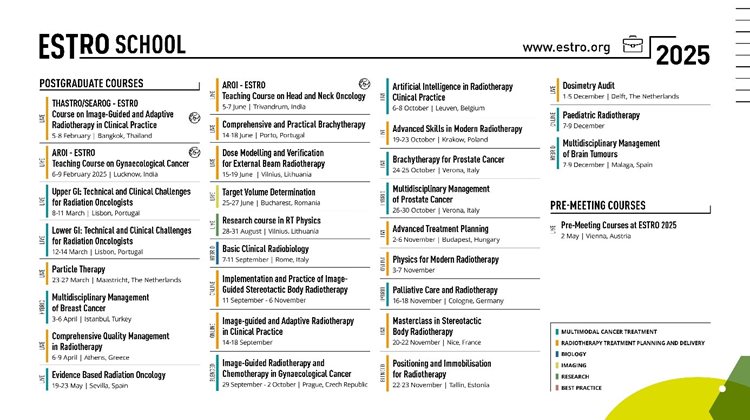One of ESTRO’s key educational initiatives is the ESTRO School, which plays an important role in the professional development of all radiation oncology professionals.
What is the ESTRO School?
The ESTRO School is an international training organisation that aims to improve, professionalise and standardise knowledge and practice in radiation oncology. It is designed to foster learning, innovation and collaboration among healthcare professionals who work in this specialised field. To accomplish this mission, the ESTRO School promotes a large range of education tools, particularly high-quality teaching courses that are based on evidence and that are focused on various aspects of radiation oncology, including the latest technologies, treatment techniques and clinical practices.
The mission of the ESTRO School is to ensure that radiation oncology professionals are equipped with the most up-to-date knowledge and practical skills to deliver the best possible care to cancer patients.
Educational Programmes and Courses
The ESTRO School provides a variety of educational programmes that are tailored to different levels of expertise, from beginner to advanced practitioner. Its activities are designed to meet the needs of practising radiation oncologists, radiation oncology residents, radiation biologists, radiation physicists and radiation therapists. The courses are based on the European Core Curricula (1–4) and cover the following aspects of radiation oncology.
- Principles and practice of radiotherapy and oncology with radiation physics and technology, radiobiology and oncology imaging (e.g., intensity-modulated radiation therapy, stereotactic body radiation therapy, image-guided radiation therapy…).
- A multidisciplinary approach to cancer treatment that fosters communication among healthcare professionals and the exchange of experience regarding a wide range of issues related to cancer, including biology, prevention, diagnosis, staging, treatment, adverse side effects, palliative care, ethical and legal aspects, management, and psychosocial implications.
In the next weeks, two articles will be published on two courses that the ESTRO School offers: one in positioning and immobilisation and another on advanced skills in modern radiotherapy.
International Collaboration and Networking
The ESTRO School promotes the international exchange of knowledge and experience in the field of radiation oncology and fosters international collaboration by bringing together professionals from around the world. It serves as a platform for networking, as it enables participants to engage with peers, share experiences, and learn from experts. Many of the school’s events feature prominent speakers and faculty members who are leaders in radiation oncology research, hence ensuring that participants receive the highest quality of education.
ESTRO School calendar
Every year, a calendar is drawn up that provides an overview of the course topics proposed by the school. This year’s calendar is shown here.

All educational activities of the school are promoted on the ESTRO website and through social media.
Conclusion
The ESTRO School is a cornerstone of education and professional development in the field of radiation oncology. As the discipline continues to evolve with new technologies and treatment strategies, the school remains committed to ensuring that healthcare professionals have the knowledge and skills they need to provide the best possible care for cancer patients. Through its comprehensive and forward-thinking educational programmes, the ESTRO School continues to shape the future of radiation oncology.
Sophie Boisbouvier is a member of the RTT Committee, editor of the RTT Corner in the ESTRO newsletter, and a teacher in the ESTRO course on Positioning and Immobilisation
References
1. Benstead K, Lara PC, Andreopoulos D, Bibault JE, Dix A, Eller YG, et al. Recommended ESTRO Core Curriculum for Radiation Oncology/Radiotherapy 4th edition. Radiotherapy and Oncology [Internet]. Dec 2019;141:1‑4. Available at: https://linkinghub.elsevier.com/retrieve/pii/S0167814019330592
2. Cristina Garibaldi, Catherine Clark, Christoph Bert. Core curriculum for medical physics experts in radiotherapy [Internet]. 2021. Available at: https://www.estro.org/ESTRO/media/ESTRO/Congresses/ICHNO/2021/Radiotherapy-CC-Cor2.pdf
3. ESTRO. European higher education area, level 6, benchmarking document for RTTs [Internet]. 2014. Available at: https://www.estro.org/ESTRO/media/ESTRO/Education/ESTRO-RTT-Benchmarking-document_rebranded.pdf
4. Coffey M, Leech M. The European Society of Radiotherapy and Oncology (ESTRO) European Higher Education Area levels 7 and 8 postgraduate benchmarking document for Radiation Therapists (RTTs). Technical Innovations & Patient Support in Radiation Oncology [Internet]. Dec 2018;8:22‑40. Available at: https://linkinghub.elsevier.com/retrieve/pii/S2405632418300295

Sophie Boisbouvier
RTT and PhD student
Centre Léon Bérard
Lyon, France
sophie.boisbouvier@lyon.unicancer.fr